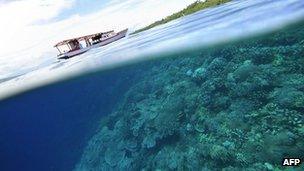Scientists urge action for coral reef protection
- Published

A report has deemed that the Coral Triangle is at risk
Scientists at a forum in Australia to discuss the future of coral reefs have called for immediate global action to save the world's reefs from decline.
Meeting at the 12th International Coral Reef Symposium in Cairns, scientists said pollution and climate change pose "major threats".
At least 85% of reefs in the Coral Triangle are also at risk, according to a recently released report.
The symposium, attended by thousands, happens once every four years.
At least 2,600 scientists <link> <caption>endorsed a petition calling for international efforts</caption> <url href="http://www.icrs2012.com/Consensus_Statement.htm" platform="highweb"/> </link> to preserve the world's coral reefs.
They are calling on governments "to take action for the preservation of coral reefs for the benefit of present and future generations".
According to the petition, "land-based sources of pollution, sedimentation, overfishing and climate change are the major threats" to coral reefs.
"There is a window of opportunity for the world to act on climate change - but it is closing rapidly," said Prof Terry Hughes, symposium convener, in a statement.
Experts have said that even the most protected reefs, like Australia's Great Barrier Reef, have seen rapid decline over the years.
A <link> <caption>report released</caption> <url href="http://www.wri.org/publication/reefs-at-risk-revisited-coral-triangle#summary" platform="highweb"/> </link> by environmental think tank the World Resources Institute with the USAID-funded Coral Triangle Support Partnership (CTSP) also said that "threats to coral reefs in the Coral Triangle are much higher than the global average".
The triangle covers Indonesia, Malaysia, Papua New Guinea, the Philippines, The Solomon Islands and East Timor.
"More than 85% of reefs within the Coral Triangle Region are currently threatened by local stressors [such as overfishing, pollution, and coastal development], which is substantially higher than the global average of 60%," the report says.
- Published23 June 2012
- Published20 June 2011
- Published15 May 2012